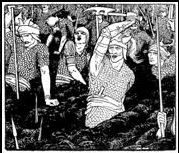The last of the seven things that God hates seems to have an emphasis that the others lack. You see the emphasis in the opening phrase of Proverbs 6:16. It says, “There are six things the Lord hates…” But then the writer says “no  wait….There are seven that he detests.” Although it’s listed as last in the list it is positioned and addressed as the most important of the seven. Lennox says, “The conclusion of this list, number one on God’s ‘Top Seven Things I Hate,’ is the man who stirs up dissension among brothers (6:19). By repeating words from 6:14, the writer has joined these two sections into one warning: God wants people to get along with one another. For those who have become part of the family of God, such a reminder is especially important, whether we are at home or church.” It’s a family affair. Did you notice the mention of “brothers?” I know that God loves people, even sinful people, and He hates the sin. But this verse has always given me pause. You might notice that the other six things that God hates refers to parts of a body; a tongue, heart, feet, eyes, hands or mouths. But this seventh thing refers to a person. It says God hates the “one who stirs up dissension” in the family. This may be a literary devise to focus attention on this last thing giving it prominence in the list as Lennox suggested. Yet, the focus on the “person” rather than the thing should give us all pause.
wait….There are seven that he detests.” Although it’s listed as last in the list it is positioned and addressed as the most important of the seven. Lennox says, “The conclusion of this list, number one on God’s ‘Top Seven Things I Hate,’ is the man who stirs up dissension among brothers (6:19). By repeating words from 6:14, the writer has joined these two sections into one warning: God wants people to get along with one another. For those who have become part of the family of God, such a reminder is especially important, whether we are at home or church.” It’s a family affair. Did you notice the mention of “brothers?” I know that God loves people, even sinful people, and He hates the sin. But this verse has always given me pause. You might notice that the other six things that God hates refers to parts of a body; a tongue, heart, feet, eyes, hands or mouths. But this seventh thing refers to a person. It says God hates the “one who stirs up dissension” in the family. This may be a literary devise to focus attention on this last thing giving it prominence in the list as Lennox suggested. Yet, the focus on the “person” rather than the thing should give us all pause.
Cadmus, in mythology, slew a dragon. He then sowed the dragon’s teeth in a field which later sprouted giants. Being fearful of what those giants might do, Cadmus turned the giants against each other. He struck one of them with a stone and pointed to another one. This giant then started a fight with the other one and before long they were all fighting each other. As they killed each other, Cadmus watched and laughed. Morgan rightly observes that, “Our churches are full of potential spiritual giants, but Satan often sows discord among the members and they end up as spiritual pygmies, fighting one another.”
When Jesus develops this negative into a positive he blesses those who stop dissension and strife and pronounces a blessing on the “peacemakers” In Matthew 5:9. The blessing consists of a new classification. Jesus says “they shall be called sons of God.” The Greek word order makes this title emphatic. It literally reads, “for they, sons of God, shall be called.” Regarding this structure Hughes says, “The idea is that they, and no others, shall be called God’s sons. Moreover, the passive voice indicates that it is God, not man, who assigns the title ‘sons.’ The sublimity of this promise comes from the fact that the title “sons of God” refers to character. The peacemaker partakes of the character of God. He is like God in the way he lives. No wonder God says, ‘Blessed are the peacemakers.’” The Psalmist gives us a blessing similar to Jesus’ blessing on peacemakers. In Psalm 133:1, we read, “Behold, how good and pleasant it is when brothers dwell in unity!”